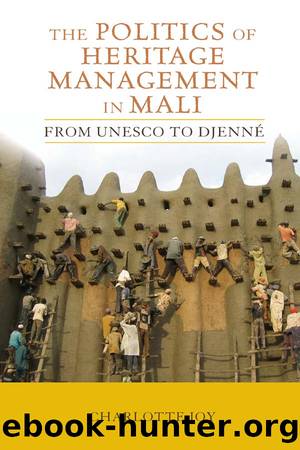The Politics of Heritage Management in Mali by Charlotte L Joy

Author:Charlotte L Joy [Joy, Charlotte L]
Language: eng
Format: epub
Tags: Social Science, Archaeology
ISBN: 9781315417516
Google: 26xmDAAAQBAJ
Publisher: Routledge
Published: 2016-06-16T05:10:17+00:00
CHAPTER 6
Artisans, Embodied Knowledge, and Authenticity
The artisans in Djenné specialise in the production of many of the textiles, jewellery, and leather products found throughout Mali. In fact, at first glance, there is nothing particularly Djennenké for touristsâ consumption, despite calls by Djenné Patrimoine for artisans to return to the basic crafts of the town (namely, embroidery and leatherwork). Djenné, like other places in the Mopti region, most famously San, is well known for its production of bogolan (âmud clothâ). The production of pottery is also widespread (La Violette, 2000). The restrictions of technology in Djenné, such as the lack of a machine to mechanically produce flat sheets or long strands of silver, does mean that the production of jewellery in Djenné is done entirely by hand, unlike other centres of production such as Mopti and Bamako. Djenné is famous for embroidery, yet embroiderers in the town, no longer able to compete with mechanically produced material, have long since had to orientate their craft toward tourist consumption and rich Malian officials. Instead of being portable forms of wealth, grands boubous (traditional long robes worn by both men and women) are now becoming artefacts that are making their way into museums or are being worn by Malian politicians on special occasions.
Artisans in Djenné are negotiating their own authenticity while seeking to diversify their production for an ever-changing tourist market. A strong theme that emerges from the study of artisans in Djenné is that the authentic production of crafts not only combines the embodied knowledge of the artisan but is also negotiated through the choice of materials used for production. Innovation in production is constant and strongly encouraged within a sometimes contradictory framework of success and failure. The artisans in Djenné are first and foremost shrewd businessmen and-women who see the outside world as a potential market for their products. Unfortunately, access to these new markets is very hard to negotiate and predict, and the creation of long-term trade relationships is very rare.
The embodied knowledge of the artisans allows their work to remain âauthenticâ while constantly changing. This embodied knowledge (conceived of by UNE SCO as intangible cultural heritage) is firmly located within Djenné, the artisans, and their families and is similar to the knowledge of the masons, who find themselves at the centre of UNE SCOâs project in Djenné (Marchand, 2006). Unlike the masons, the artisans constantly have to adapt to an external tourist market. However, a discussion of the negotiation of authenticity through practice is relevant to the work of the masons who also have to adapt to new economic realities and international interest while maintaining their integrity as masons.
Download
This site does not store any files on its server. We only index and link to content provided by other sites. Please contact the content providers to delete copyright contents if any and email us, we'll remove relevant links or contents immediately.
Spell It Out by David Crystal(35849)
Life for Me Ain't Been No Crystal Stair by Susan Sheehan(35536)
Cecilia; Or, Memoirs of an Heiress — Volume 1 by Fanny Burney(32064)
Cecilia; Or, Memoirs of an Heiress — Volume 3 by Fanny Burney(31458)
Cecilia; Or, Memoirs of an Heiress — Volume 2 by Fanny Burney(31409)
The Great Music City by Andrea Baker(30784)
Professional Troublemaker by Luvvie Ajayi Jones(29422)
We're Going to Need More Wine by Gabrielle Union(18635)
Twilight of the Idols With the Antichrist and Ecce Homo by Friedrich Nietzsche(18303)
The Secret History by Donna Tartt(18168)
Cat's cradle by Kurt Vonnegut(14763)
All the Missing Girls by Megan Miranda(14748)
Pimp by Iceberg Slim(13781)
Bombshells: Glamour Girls of a Lifetime by Sullivan Steve(13687)
Fifty Shades Freed by E L James(12918)
Talking to Strangers by Malcolm Gladwell(12878)
Norse Mythology by Gaiman Neil(12836)
The Social Justice Warrior Handbook by Lisa De Pasquale(11956)
Underground: A Human History of the Worlds Beneath Our Feet by Will Hunt(11840)
